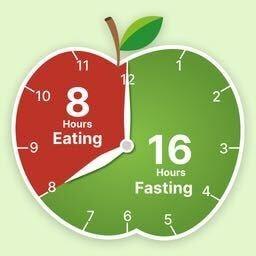Intermittent fasting limits eating to specific periods and is popular for weight loss and general health benefits. How does it work? This article explores the methods of intermittent fasting, its health impacts, and potential risks, helping you decide if it’s right for you.
Key Takeaways
- Intermittent fasting is characterized by specific eating windows, promoting weight loss and potential health benefits, but its long-term effects remain unclear.
- While it may improve metabolic health and blood sugar control, intermittent fasting carries risks, particularly for vulnerable populations such as pregnant women and those with certain health conditions.
- Consultation with healthcare professionals is always recommended before commencing intermittent fasting to assess individual health risks and ensure nutritional balance is maintained.
Understanding Intermittent Fasting

An illustration of a plate with a clock that depicts intermittent fasting.
Intermittent fasting involves restricting calorie intake by eating during specific hours, making it a popular method for weight loss and health improvement. Unlike traditional diets, this pattern of eating doesn’t specify what foods to eat but rather when to eat them. This simplicity is one of its main attractions.
Proponents of intermittent fasting argue that it enhances health and aids in weight loss, boosting its increasingly popular status.
Types of Intermittent Fasting
There are different methods of intermittent fasting, with time-restricted eating and alternate-day fasting being the most common. Time-restricted eating involves fasting for a limited number of hours each day, typically between 6 to 16 hours. Common patterns include eating earlier and fasting in the afternoon or fasting in the morning and eating in mid-afternoon.

Graphic showing the 9 different types of intermittent fasting.
Alternate-day fasting consists of eating a regular diet one day. The following day, no meals are consumed. Aligning fasting periods with sleeping hours can make these eating patterns easier to follow on alternate days.
Common Intermittent Fasting Methods include:
- 16/8: Fast for 16 hours, eat within an 8-hour window (most popular).
- 5:2: Eat normally 5 days a week, eat ~500-600 calories on 2 non-consecutive days.
- OMAD: One meal a day – extreme, but some use it for simplicity.
What Happens to The Body During Intermittent Fasting?
Fasting periods trigger cellular repair and energy optimization during the fasting period, enhancing bodies’ functions. Cells focus on repairing damage and optimizing their energy use, leading to improved metabolism and overall health.
These processes largely explain the health benefits associated with intermittent fasting.
Health Benefits of Intermittent Fasting
This eating pattern supports cellular repair and energy regulation. Although it shows short-term health improvements, long-term effects are still uncertain. Meta-analyses suggest that intermittent fasting may improve metabolic health, though individual responses can vary significantly.
Systematic reviews indicate mixed outcomes, highlighting the importance of individual dietary contexts. Though popular, some research suggests it may not drastically lower overall mortality rates.

A graphic showing the 7 effects of intermittent fasting.
Weight Loss and Fat Reduction
Intermittent fasting may enhance metabolic health by promoting fat loss while preserving lean mass. Randomized controlled trials indicate that intermittent fasting can lead to weight loss, but the sustainability of these results over time remains uncertain. Some studies have shown that intermittent fasting may not offer significant advantages over traditional calorie restriction for weight loss.
Key nutritional recommendations for intermittent fasting include:
- Consume nutrient-rich foods during eating periods to meet nutritional needs.
- Reduce added sugars and unhealthy fats.
- Ensure a variety of nutrients in meals to support health and energy during fasting.
Improved Blood Sugar Control
It might improve insulin sensitivity and stabilize blood sugar levels. Studies show it can reduce inflammation, fasting blood sugar levels, and improve insulin sensitivity.
However, people with diabetes might face a side effect on blood sugar levels, indicating the need for caution.
Cellular Benefits
- Autophagy: Fasting triggers this “cellular cleanup” process where the body removes damaged cells and regenerates.
- Helps prevent diseases like cancer and Alzheimer’s dementia (evidence mostly from animal studies).
Cardiovascular Health
It may benefit heart health by lowering blood pressure and improving cholesterol profiles. Some research suggests it can lower blood pressure, enhancing heart health and its health effects.
One study found a 91% increased risk of cardiovascular disease death for participants following an 8-hour eating window opens compared to those with the same amount of extended period of eating.
Brain Health
- Increases brain-derived neurotrophic factor (BDNF), a protein that supports cognitive function.
- May improve mental clarity and focus due to stable energy levels (no post-meal crashes).
Potential Risks and Side Effects
Intermittent fasting has potential benefits but also carries risks and side effects. The following groups may face serious side effects and should be cautious:
- Pregnant women
- Nursing mothers
- Children
- Older adults
Young and older adults should be especially cautious due to higher susceptibility to adverse effects and various risk factors.
Fasting can cause symptoms like headaches and fatigue in some individuals. Overeating to compensate for food deprivation is another risk. Mixed research results on its long-term safety indicate a need for further studies.
Low Blood Sugar and Hypoglycemia
Increased hunger during the initial days of fasting can lead to low blood sugar levels. Untreated hypoglycemia can cause severe complications like seizures and brain damage. It can cause low blood sugar, particularly in those sensitive to dietary changes.
Mood Disturbances and Fatigue
Fasting-related fatigue often comes with irritability and mood swings. Mood disturbances from intermittent fasting stem from fluctuating hunger and energy levels.
These mood swings and fatigue can disrupt sleep, affecting overall health. Being aware of these mood disturbances and fatigue is crucial for those considering or practicing intermittent fasting.
Eating Disorders and Disordered Eating
Dieting often leads to an unhealthy fixation on food and body size, increasing the risk of an eating disorder. It can exacerbate or hide disordered eating behaviors in those with existing eating disorders. Ignoring hunger cues during fasting can foster a disordered relationship with food.
It can trigger body dissatisfaction, compulsive exercise, and low self-esteem in vulnerable individuals. Extended food deprivation during fasting can lead to an all-or-nothing mindset, similar to binge behavior.
Who Should Avoid Intermittent Fasting?
Not everyone should practice intermittent fasting. Pregnant or breastfeeding women, older adults, and those with specific health conditions should avoid it for their well-being.
Pregnant or Breastfeeding Women
Pregnant or breastfeeding individuals need more nutrients to support their health and their child’s. Due to restricted eating periods, intermittent fasting may not meet these nutritional needs, especially in a fed state.
Generally, pregnant or breastfeeding women are advised against intermittent fasting.
Individuals with Certain Health Conditions
People with diabetes face a greater risk of low blood sugar during fasting. Hypoglycemia is a significant risk during fasting for those with diabetes. It can adversely impact diabetes management.
Those with diabetes or a history of eating disorders should consult a doctor before starting intermittent fasting. Consulting a healthcare provider can help identify any health risks associated with intermittent fasting. Those with pre-existing health conditions should seek professional advice before starting fasting.
Young Adults and Older Adults
Young and older adults may need to avoid or be cautious with intermittent fasting due to their specific health needs. These groups face unique health risks, making fasting unsuitable for them.
Practical Tips for Practicing Intermittent Fasting
Practical tips can enhance success for those considering fast fasting.
Choosing a fasting method that aligns with your lifestyle and health goals is important.
Choosing the Right Fasting Regimen
Select a fasting method based on your hunger patterns and lifestyle.
Planning meals in advance helps maintain adherence to an eating plan while following a fasting schedule.
Maintaining Nutritional Balance
A healthy eating diet maximizes the benefits of intermittent fasting. This ensures the body gets essential nutrients and energy while managing calories. A balanced diet helps prevent fatigue and mood swings.
During eating windows, follow these guidelines:
- Consume whole foods rich in nutrients, like fruits, vegetables, lean proteins, and whole grains.
- Set specific nutritional goals to help maintain muscle while losing weight.
- Plan meals ahead and include various food groups to maintain a balanced diet during fasting as part of your weight loss strategy.
Consulting Healthcare Professionals
Consulting a healthcare professional before starting intermittent fasting is advisable, especially for those with pre-existing health conditions. Checking with a doctor helps identify and manage potential health risks.
Research and Studies on Intermittent Fasting
Research is essential to understand the potential benefits and risks of intermittent fasting for humans. Studies suggest it may offer various health benefits, though human data is limited.
Since many studies rely on animal data, evidence suggests findings should be cautiously interpreted for human health relevance.
Evidence from Randomized Controlled Trials
Randomized controlled trials validate the effectiveness and safety of intermittent fasting. A JAMA Internal Medicine study found no differences in weight loss between those practicing intermittent fasting and a control group.
Meta-Analyses and Systematic Reviews
Meta-analyses consolidate research findings, providing clearer evidence on the effectiveness of intermittent fasting. Pooling data from various studies, meta-analyses identify patterns and trends in the health impacts of fasting. Recent meta-analyses show that fasting may lead to significant improvements in weight loss, metabolic health, and chronic disease prevention.
Systematic review integrates findings from a randomized controlled trial, reinforcing conclusions about the benefits and risks of fasting.
Final Thoughts
Intermittent fasting presents a unique approach to managing diet and health. While it offers potential benefits such as weight loss, improved blood sugar control, and enhanced cardiovascular health, it also comes with risks that need careful consideration. Pregnant or breastfeeding women, individuals with certain health conditions, and young or older adults should avoid intermittent fasting or consult healthcare professionals before starting. Practical tips, including choosing the right regimen and maintaining nutritional balance, can help maximize benefits and reduce risks. As research continues to evolve, staying informed and cautious is key to making the best decisions for your health.
Frequently Asked Questions
What is intermittent fasting?
Intermittent fasting is a dietary approach that alternates between eating and fasting periods, which can aid in weight loss and enhance overall health. This method emphasizes calorie restriction during designated hours.
What are the different types of intermittent fasting?
Intermittent fasting includes various methods such as time-restricted eating, which involves fasting for 6 to 16 hours daily, and alternate-day fasting, where one eats normally on one day and fasts the next. Each method offers unique benefits and can be tailored to individual lifestyles.
What are the potential health benefits of intermittent fasting?
Intermittent fasting may offer health benefits such as improved metabolic health, weight loss, better blood sugar control, and enhanced cardiovascular health. However, individual responses can vary significantly.
Who should avoid intermittent fasting?
Individuals who are pregnant or breastfeeding, those with specific health conditions, and very young or older adults should avoid intermittent fasting or seek guidance from healthcare professionals.
How can I ensure success with intermittent fasting?
To ensure success with intermittent fasting, select a method that aligns with your lifestyle, adhere to a balanced diet, and consult healthcare professionals to mitigate any health risks.
Medical Disclaimer
NowPatient has taken all reasonable steps to ensure that all material is factually accurate, complete, and current. However, the knowledge and experience of a qualified healthcare professional should always be sought after instead of using the information on this page. Before taking any drug, you should always speak to your doctor or another qualified healthcare provider.
The information provided here about medications is subject to change and is not meant to include all uses, precautions, warnings, directions, drug interactions, allergic reactions, or negative effects. The absence of warnings or other information for a particular medication does not imply that the medication or medication combination is appropriate for all patients or for all possible purposes.













